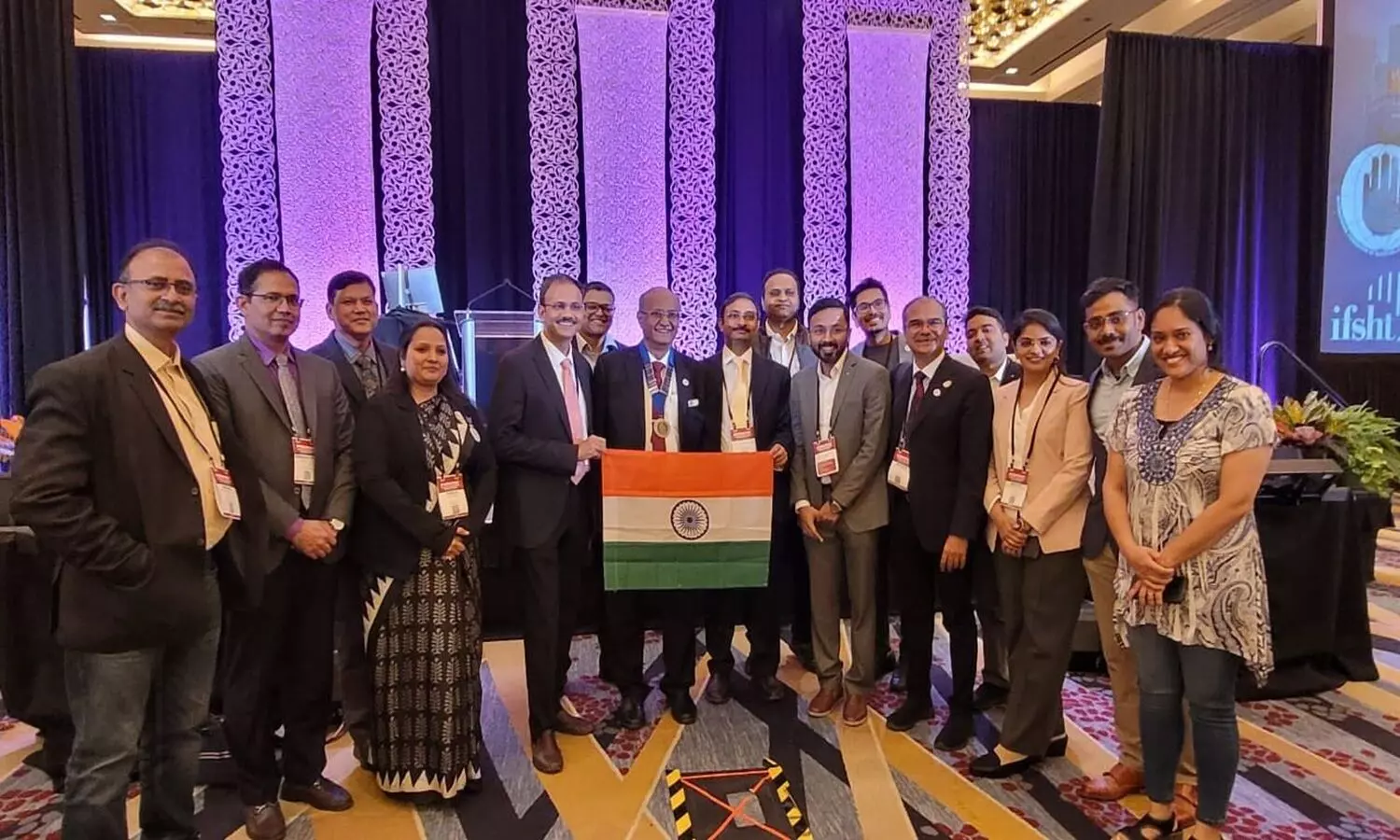How lack of sleep impacts your waistline and blood sugar levels - Times of India
- How lack of sleep impacts your waistline and blood sugar levels Times of India
- Poor sleep: Health risks and proven solutions The Indian Express
- Setting The Stage For Quality, Restorative Sleep Forbes
- 5 simple and easy sleep hacks that actually work! Mint
- Struggling to sleep? Try these 6 simple tricks tonight The Economic Times
4 months 1 week ago
Statins could reduce dementia risk even if you have low cholesterol - The Telegraph
- Statins could reduce dementia risk even if you have low cholesterol The Telegraph
- Lowering bad cholesterol may cut risk of dementia by 26%, study suggests The Guardian
- The Cholesterol Sweet Spot That Shields Your Brain From Dementia SciTechDaily
- Study links low LDL-C levels to reduced risk of dementia News-Medical
- Medication already taken by one in seven people in the UK slashes the risk of dementia a major new study has f Daily Mail
4 months 1 week ago
Health – Demerara Waves Online News- Guyana
Plans to integrate technical institutes’ engineering courses with UG programmes
4 months 1 week ago
Education, Health, News, Caribbean Accreditation Authority for Education in Medicine and Other Health Professions (CAAM-HP), College of Medical Sciences Building, dental clinic, engineering courses, integration, technical institutes, transfer of credits, University of Guyana (UG)
New study says Lexington has among the highest STI rates in the country - WKYT
- New study says Lexington has among the highest STI rates in the country WKYT
- 2 SC cities face rising STD rates, among highest in US for 2025, study shows. See the full list The State
- 2 Kentucky cities among US metros with highest STD rates, study says. See full list Lexington Herald Leader
- Ohio, Kentucky cities named in Top 25 U.S. cities with highest STI rates WKRC
- 8 Texas cities have among the highest STD rates in the country, study says. See the full list Fort Worth Star-Telegram
4 months 1 week ago
Fasting every other day outperforms calorie cutting, clinical trial indicates - upi.com
- Fasting every other day outperforms calorie cutting, clinical trial indicates upi.com
- Weight loss: Intermittent fasting may be more efficient than dieting MedicalNewsToday
- This three-day-a-week diet leads to more weight loss than daily calorie counting: study New York Post
- Intermittent fasting can be hit or miss, but research suggests 'sweet spot' can help some stick to their diet ABC News
- Intermittent Fasting 3 Days a Week Tops Calorie Restriction for Weight Loss MedPage Today
4 months 1 week ago
Weight loss: Intermittent fasting may be more efficient than dieting - Medical News Today
- Weight loss: Intermittent fasting may be more efficient than dieting Medical News Today
- Fasting every other day outperforms calorie cutting, clinical trial indicates upi.com
- This three-day-a-week diet leads to more weight loss than daily calorie counting: study New York Post
- Intermittent fasting can be hit or miss, but research suggests 'sweet spot' can help some stick to their diet ABC News
- 4:3 Intermittent Fasting Outperforms Daily Calorie Restriction in Weight-Loss Study CU Anschutz newsroom
4 months 1 week ago
Medical News, Health News Latest, Medical News Today - Medical Dialogues |
Serum MCP-1 and Osteopontin May Predict Early Renal Injury in Gout: Study
4 months 1 week ago
Nephrology,Nephrology News,Top Medical News
Build Your "Brain Bank" Now To Prevent Cognitive Decline In Your 70 Or 80s - MindBodyGreen
- Build Your "Brain Bank" Now To Prevent Cognitive Decline In Your 70 Or 80s MindBodyGreen
- Will Stimulating My Brain as I Age Keep It Sharp? The New York Times
- Does Wordle help? South Florida experts reveal ways keep your brain sharp Sun Sentinel
- Expert tips on how to keep memory razor sharp Times of India
- I've been studying the brain for 20 years. People who stay sharp throughout life do these 5 things CNBC
4 months 1 week ago
Three of the most obese cities in the US are in Alabama - AL.com
- Three of the most obese cities in the US are in Alabama AL.com
- This South Texas city has worst weight-related problems in U.S., study says San Antonio Express-News
- 2 Michigan Cities Among the Most Obese in U.S. 97.9 WGRD
- Augusta ranked one of the ‘most obese cities’ by WalletHub AJC.com
- Missouri City Lands on Most Obese City List for 2025 97.9 KICK FM
4 months 1 week ago
HHS starts layoffs of thousands of workers across its agencies
4 months 1 week ago
Breaking News, Politics, CDC, FDA, HHS, Public Health, RFK Jr.
2 SC cities face rising STD rates, among highest in US for 2025, study shows. See the full list - The State
- 2 SC cities face rising STD rates, among highest in US for 2025, study shows. See the full list The State
- New study says Lexington has among the highest STI rates in the country WKYT
- Ohio, Kentucky cities named in Top 25 U.S. cities with highest STI rates WKRC
- 2 Kentucky cities among US metros with highest STD rates, study says. See full list Lexington Herald Leader
- 8 Texas cities have among the highest STD rates in the country, study says. See the full list Fort Worth Star-Telegram
4 months 1 week ago
How to keep your memory sharp as you age - The Washington Post
- How to keep your memory sharp as you age The Washington Post
- Will Stimulating My Brain as I Age Keep It Sharp? The New York Times
- I've been studying the brain for 20 years. People who stay sharp throughout life do these 5 things CNBC
- Does Wordle help? South Florida experts reveal ways keep your brain sharp Sun Sentinel
- Landmark clinical trial shows how to maintain the brain as we age NZ Herald
4 months 1 week ago
Intermittent fasting can be hit or miss, but research suggests 'sweet spot' can help some stick to their diet - ABC News
- Intermittent fasting can be hit or miss, but research suggests 'sweet spot' can help some stick to their diet ABC News
- The Effect of 4:3 Intermittent Fasting on Weight Loss at 12 Months: ACP Journals
- Is intermittent fasting or calorie restriction better for weight loss? Here's what a new study found. CBS News
- This three-day-a-week diet leads to more weight loss than daily calorie counting: study New York Post
- Intermittent Fasting 3 Days a Week Tops Calorie Restriction for Weight Loss MedPage Today
4 months 1 week ago
Intermittent fasting beats daily calorie cutting for weight loss, scientists say - Financial Times
- Intermittent fasting beats daily calorie cutting for weight loss, scientists say Financial Times
- Intermittent fasting can be hit or miss, but research suggests 'sweet spot' can help some stick to their diet ABC News
- Fast, Don’t Count: How the 4:3 Fasting Rhythm Beat Daily Dieting in a Yearlong Study SciTechDaily
- This 3-day-a-week diet could be a vital weight loss strategy, say scientists BBC Science Focus Magazine
- How many days you need to fast to lose more weight than dieting The Telegraph
4 months 1 week ago
The Most Obese City in Missouri is…….. - 97.9 KICK FM
- The Most Obese City in Missouri is…….. 97.9 KICK FM
- Three of the most obese cities in the US are in Alabama AL.com
- This South Texas city has worst weight-related problems in U.S., study says San Antonio Express-News
- Augusta ranked one of the ‘most obese cities’ by WalletHub AJC.com
- Inside 'fattest city in US' where nearly half of the population is obese Daily Star
4 months 1 week ago
Health Archives - Barbados Today
A stroke survivor speaks again with the help of an experimental brain-computer implant
4 months 1 week ago
Health, United States, World
Bauta Rojas accuses Agriculture Minister of irresponsibility over swine flu
4 months 1 week ago
Health
Medical News, Health News Latest, Medical News Today - Medical Dialogues |
Novartis appoints Karen Hale as Chief Legal and Compliance Officer
4 months 1 week ago
News,Industry,Pharma News,Latest Industry News
Medical News, Health News Latest, Medical News Today - Medical Dialogues |
Dr S Raja Sabapathy takes over Presidency of International Federation of Societies for Surgery of the Hand
4 months 1 week ago
State News,News,Health news,Tamil Nadu,Doctor News,Latest Health News,Recent Health News




